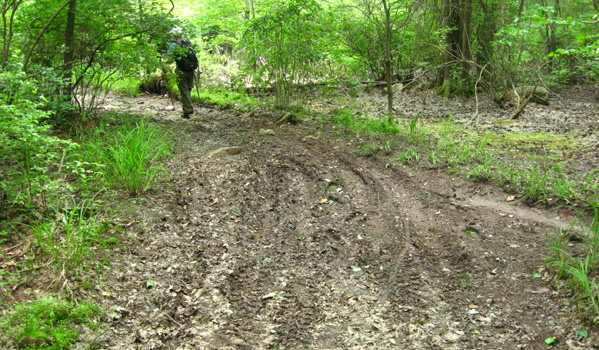NJ Enacts Off-road Vehicle Legislation after 10-Year Fight, But Implementation Is on Hold
Title
Body

By Brenda Holzinger, a Trail Conference volunteer and ATV regulation advocate
Off-road vehicles, including ATVs, snowmobiles, and dirt bikes, are now subject to mandatory statewide registration and enforcement measures in New Jersey thanks to legislation passed and signed in the last days of the Corzine administration.
This legislation is the culmination of nearly 10 years of effort, including two final years of intense negotiations between off-road vehicle riders, environmental groups (including the Trail Conference), and the bill sponsors. It was passed with substantial margins-indicating broad support-by the Senate and the Assembly during their final voting sessions in early January. Governor Corzine signed the bill on his final day in office.
The legislation requires registration of all off-road vehicles as well as identification tags and insurance. It also increases the penalties for illegal riding on public lands or private property without the owner's permission. Not only will those caught riding illegally be subject to fines starting at $250 for a first offense, $500 for a second offense ,and $1,000 for all subsequent violations, but they will also now be liable for five times the estimated cost of damage to the state's natural resources. This restoration fine is an important piece of the legislation because the NJ Dept. of Environmental Protection (DEP) estimates that the annual cost of damage to public lands from illegal off-road vehicles is about $1 million. Preserved farmland also incurs about the same amount of damage from off-road vehicles annually. The law authorizes the DEP to impound off-road vehicles until assessed fines are paid.
Law Requires Siting
Of 3 ATV Parks
The new law also requires that DEP site three parks on state land, one each in the northern, central, and southern parts of the state. Unfortunately, the ATV lobbyists were able to secure a last-minute compromise by the legislature, which requires that the DEP site at least one park before the provisions of the bill actually go into effect. If the DEP is unable to find sites for the three parks within three years, at the beginning of the fourth year the newly increased fines will be reduced and revert to the structure that was in place before the current law was passed.
These later provisions were bitterly opposed by the Trail Conference given that the tools to enforce existing laws against abusing publicly financed conservation lands should not be held hostage to the uncertain prospect of finding municipalities that will accept an off-road riding parks within their boundaries.
The sponsors of the bill plan to be actively involved in the process of finding park sites because the definition of "designating a park site" is not contained in the legislation. This is not an oversight, but rather a way to allow maximum flexibility as the DEP establishes implementation regulations. There is approximately $250,000 earmarked for motorized vehicle trails in New Jersey through the federal Recreational Trails program run by the Department of Transportation. This money is available to the DEP for use in siting the off-road vehicle parks.
In fact, this pool of money, as well as all the other money available for nonmotorized trails, is in jeopardy of being recalled by the Department of Transportation because New Jersey has been unable to find a way to use any of the accumulated motorized trails money. Local and county governments and conservation organizations (including the Trail Conference) depend upon these grants for new trail projects and trail restoration needs. (The New Jersey Trails Council, working together with the DEP, chooses the successful grant applications and oversees ongoing projects.)
The Trail Conference started its fight for statewide ATV legislation nine years ago with a bi-state, multi-stakeholder ATV summit in 2001. Legislative efforts began following this summit, and it has taken four legislative sessions, each two years in duration, to arrive at the current state law in New Jersey.
The need for this legislation, including the park siting provision, became increasingly urgent after the New Jersey Off-Road Vehicle Park run by NJ Audubon near Chatsworth closed last year, when its 10-year, nonrenewable permit expired. When NJ Audubon decided to run this ATV park, the hope was that it would motivate some off-road vehicle enthusiasts to take the lead in creating their own parks using the Recreational Trails money. However, after more than 10 years, that has not happened. This is a key reason why the sponsors of A823 and S2055 were willing to allow the compromise in their legislation requiring DEP to site three parks.
Are We There Yet?
Although it might seem like the work is over now that statewide legislation has become law, the actuality is that the work is just beginning ... again. The day after they passed their respective bills, both the Senate and Assembly sponsors of the ATV legislation pre-filed bills for the 2010-2011 session concentrating on technical amendments. It will be necessary for the trail stewardship community to remain actively engaged in this process because often the technical amendments and the implementation regulations are really the substance of the law, while the law itself is simply a broad outline of a particular policy position.
Also, it is not clear exactly how the park siting process will transpire and what levels of government in New Jersey will be involved. The details of the process will be the product of lobbying and negotiation among the bill sponsors and the stakeholders.
Finally, a grassroots effort aimed at persuading towns and counties in northern New Jersey to adopt their own local ATV ordinances is important because it would bolster the statewide law and could address any local lands not covered at the state level.
